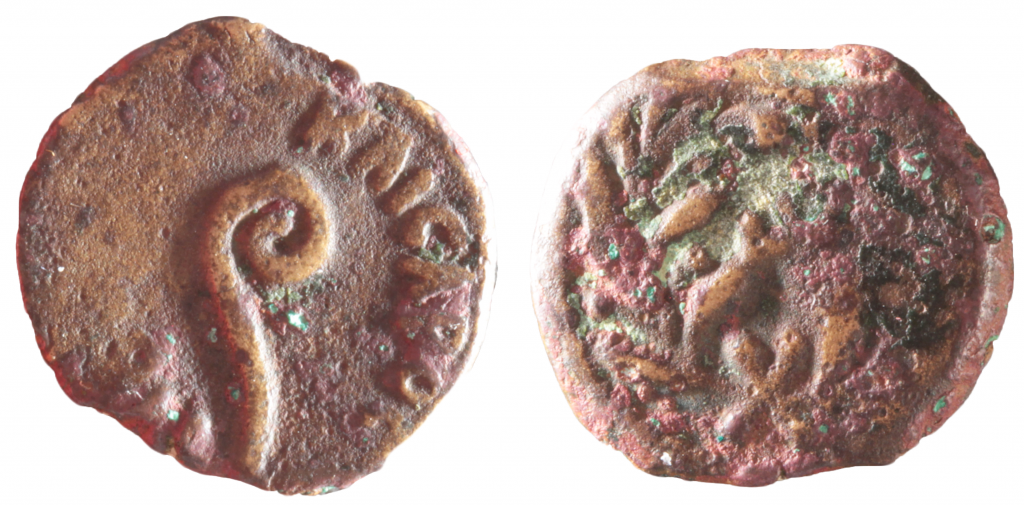April 5, 2015, by Will Leveritt
A coin of Pontius Pilate for Easter
Text by Will Leveritt
Image by Kelly Grimshaw
The coin below was issued by Pontius Pilate, the Roman magistrate in Judaea between AD 26 and 36/7. Though obviously rather an important figure in the New Testament, Pilate gets only brief mention in sources outside the Bible. What do these other sources tell us of the character of this enigmatic man, who figures so prominently in the story of Easter?

AE prutah of Pontius Pilate. Obverse has lituus, around which TIBEPIOY KAICAPOC.
Reverse has wreath with date mark inside, sadly illegible. 2.07g, 16mm.
The Roman historian Tacitus gives a little detail in a side comment he makes while discussing the Great Fire of Rome, which he says Nero blamed on the Christians:
Christus, the originator of the movement, had been put to death by the procurator Pontius Pilate when Tiberius was emperor; repressed for a moment the deadly superstition again broke out, not only in Judaea, the source of this mischief, but even in Rome, where from everywhere all things which are savage and shameful come together and are glorified.
auctor nominis eius Christus Tiberio imperitante per procuratorem Pontium Pilatum supplicio adfectus erat; repressaque in praesens exitiabilis superstitio rursum erumpebat, non modo per Iudaeam, originem eius mali, sed per urbem etiam quo cuncta undique atrocia aut pudenda confluunt celebranturque.
Tacitus Annals 15.44.
Tacitus’ use of the title procurator is intriguing and has attracted a great deal of discussion due to the fact an inscription found at Caesarea Maritima in 1961 identifies Pilate not as a procurator, but as a praefectus; on balance this was probably his official title. At any rate it should be remembered that Judaea at the time was not an independent province, and Pilate was subordinate to the governor at Syria.
The author Josephus consistently presents Pilate as a cruel man. He reports that after spending sacred money on an aqueduct, Pilate had those who complained about this desecration of religious funds beaten to death; many others perished in the ensuing stampede (Jewish Wars 2.175). Pilate’s conduct during the siege of Tirathaba was so appalling the Samaritan council sent to L. Vitellius in Syria to complain (this man was not the later emperor Vitellius, but rather his father).
When the uproar was made calm the Samaritan council went to Vitellius, a man of consular rank who had the governorship of Syria, and accused Pilate of the slaughter of those killed.
Καταστάντος δὲ τοῦ θορύβου Σαμαρέων ἡ βουλὴ παρὰ Οὐιτέλλιον ὑπατικὸν ἴασιν ἄνδρα Συρίας τὴν ἡγεμονίαν ἔχοντα καὶ Πιλάτου κατηγόρουν ἐπὶ τῇ σφαγῇ τῶν ἀπολωλότων.
Josephus Antiquities of the Jews 18.88.
The council explained that their actions in the town of Tirabatha had not been designed as an attempt to shake off Roman rule, but simply to gain some breathing space from the violence and cruelty of Pilate. Though probably acquiescing for personal reasons, Vitellius seems to have believed the Samaritan deputation:
Vitellius sent Marcellus, a friend of his, to be curator of Judaea and commanded Pilate to return to Rome and answer before the emperor the accusations which the Samaritans were making. And so Pilate, having spent ten years in Judaea, hurried to Rome obedient to Vitellius, whom he would not defy. But before he arrived in Rome Tiberius had already been killed.
καὶ Οὐιτέλλιος Μάρκελλον τῶν αὐτοῦ φίλων ἐκπέμψας ἐπιμελητὴν τοῖς Ἰουδαίοις γενησόμενον Πιλᾶτον ἐκέλευσεν ἐπὶ Ῥώμης ἀπιέναι πρὸς ἃ κατηγοροῖεν οἱ Σαμαρεῖται διδάξοντα τὸν αὐτοκράτορα. καὶ Πιλᾶτος δέκα ἔτεσιν διατρίψας ἐπὶ Ἰουδαίας εἰς Ῥώμην ἠπείγετο ταῖς Οὐιτελλίου πειθόμενος ἐντολαῖς οὐκ ὂν ἀντειπεῖν. πρὶν δ᾽ ἐν τῇ Ῥώμῃ ἴσχειν αὐτὸν φθάνει Τιβέριος μεταστάς.
Josephus Antiquities of the Jews 18.89.
The death of Tiberius occurred on March 16th 37; given that Tiberius was not known for his leniency perhaps Pilate breathed a sigh of relief at how events turned out. Nevertheless it is at this point we lose the thread of Pilate’s life.
In contrast to the New Testament then, these sources present Pilate as a cruel and savage man: needless to say, he was characterised differently according to the differing agendas of the authors, and where the historical man sat between these two poles it is hard to say. The last word should go to the praefectus himself, who may have appreciated the impossibility of certainty:
Pilate said to him: What is truth?
λέγει αὐτῷ ὁ Πιλᾶτος• Τί ἐστιν ἀλήθεια;
John 18:38
No comments yet, fill out a comment to be the first

Leave a Reply